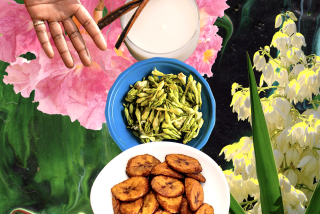Adrian Esquino Lisco, 68; was spiritual leader of indigenous community in El Salvador
- Share via
Adrian Esquino Lisco, who rose to prominence in El Salvador as a spiritual leader of the indigenous community and who called attention to atrocities committed during the 1980-92 civil war, has died. He was 68.
Esquino Lisco died Sept. 8 of kidney failure and other complications of diabetes at a hospital in San Salvador.
El Salvador’s small indigenous population, about 1% of the 7 million who live there, long endured bloody conflicts with the government, which has been led mostly by army officers or oligarchs.
A farmer and artisan, Esquino Lisco made international news by publicizing the February 1983 army-led attack on an indigenous farm cooperative in Las Hojas, a village in the western end of the country. He said the soldiers rounded up 74 men, tied their thumbs behind their backs and shot them in their skulls. A federal judge reported 18 deaths.
Esquino Lisco and his supporters blamed wealthy landowners troubled by the farm cooperative, which they considered subversive. Agrarian reform had blossomed briefly in the late 1970s but was soon revoked, causing a generation of resentment on all sides.
A federal commission in El Salvador to study human rights violations went nowhere, reportedly under army pressure. In the early 1990s, the officers widely thought to have commanded the troops at Las Hojas were granted amnesty in a Central American peace plan.
Esquino Lisco, of Nahoa heritage, was born Dec. 2, 1938, in Comarca San Ramon, in the western Sonsonate province. An older brother was among the tens of thousands of indigenous casualties in the 1932 peasant uprising, which the dictatorship violently suppressed.
In 1954, Esquino Lisco’s father started the National Assn. of Indigenous Salvadorans to maintain the customs, ceremonies and language of the Maya, Lenca and Nahoa peoples. Esquino Lisco inherited the title of spiritual chief in 1976 and said he attracted thousands of followers.
For years, the organization worked quietly to preserve the indigenous heritage. In the late 1970s, Esquino Lisco participated in worldwide conferences of indigenous peoples that brought him valuable contacts with native communities throughout North America. The association won legal recognition by the Salvadoran government in 1980, under President Jose Napoleon Duarte’s administration, which also had promised land reforms.
Six years into the civil war, Esquino Lisco came to Washington to consult with influential members of Congress. Francisco Acosta, a Maryland-based activist from El Salvador, said Esquino Lisco’s work with Congress led to the release of more than 100 indigenous political prisoners in El Salvador.
After such successes, Esquino Lisco faced a variety of assaults on his reputation, and his family continued to face physical threats. Esquino Lisco’s son Margarito was granted political asylum with his family in Maryland after he was beaten and female relatives were raped in the early 1990s by what they described as government death squads.
In 1999, a U.S. State Department report on human rights practices said Esquino Lisco was accused of corruption and lying by one segment of the association, and police arrested him for occupying the organization’s property illegally after he had been removed as leader.
He was exonerated of criminal fraud charges, allegations he saw as politically motivated by the country’s right-wing Arena Party. He continued to act as the spiritual leader of the association until turning over the position to Margarito two years ago.
His first wife, Mercedes Crespin Zacapa, died in April. A daughter from that marriage died in 1993. Survivors include Elba Perez, whom he married three months ago, and eight children from his first marriage.
More to Read
Sign up for Essential California
The most important California stories and recommendations in your inbox every morning.
You may occasionally receive promotional content from the Los Angeles Times.










